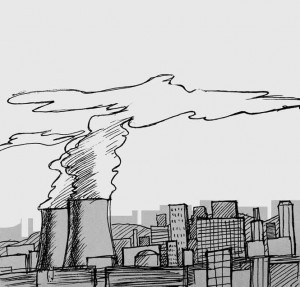Nuclear energy still valuable
The nuclear crisis playing out before our eyes in Japan has been deemed by many a wake-up call. Some have even called it a turning point, for the future of nuclear power in the United States and around the world.
Nuclear power is on trial, with some, including Rep. Ed Markey (D-Mass.), calling for a moratorium on the construction of new nuclear plants, specifically in earthquake-prone regions.
This crisis should serve as an impetus for us to evaluate the preparedness of our own nuclear power plants in the event of natural disaster or other adverse events.
Lessons learned from Japan’s crisis should also be used to improve safety standards and ensure similar crises do not occur.
We should not, however, rush to make judgments about the fate of nuclear power.
Responding to a disaster without the time, information and hindsight necessary to make an informed decision is a perfect recipe for overcompensating and turning one mishap into yet another.
Nuclear reactors have operated successfully and safely for decades in countries from the United States and France to Japan and India.
In the past 50 years, there has been only one nuclear accident that has resulted in deaths — the Chernobyl disaster of 1986.
The Chernobyl plant contained poorly designed reactors and virtually no safety procedures, very much unlike those built and operated in the United States. The plant then exploded because of a power surge. Greenpeace estimates the explosion to have caused 200,000 deaths and immeasurable environmental damage.
The infamous Three Mile Island accident in Harrisburg, PA which took place in 1979, one of the most serious nuclear accidents in United States history, was caused by a stuck valve and resulted in no deaths and no radiation leakage.
Nevertheless, nuclear plants are continuously updated and held to higher safety standards.
Plants will continue to become safer and more efficient in the future.
Rather than vilifying nuclear power, we must recognize every major energy source we have today has its own risks and downsides.
The issue at hand is not to find an immaculate, flawless source of energy, but rather to identify the source with the lowest risks and highest benefits and invest in making it even better.
At this point, nuclear power appears to be that source, at least until the green industry has a chance to develop and meet a major portion of our energy needs.
Oil and coal have had far worse records than nuclear power, both in terms of health effects and environmental impact (think BP oil spill).
Far more American workers have died in coal mine and oil drilling ones than in nuclear accidents, and this does not even account for the health effects and deaths caused by pollution from these traditional sources of energy.
Nuclear power is a clean, efficient, domestic and essentially renewable form of energy that was staging a comeback in popular opinion up until just days ago.
We should not be too quick to condemn such a valuable asset in the heat of the moment.
Justin Davidoff is a sophomore majoring in Judaic studies.

